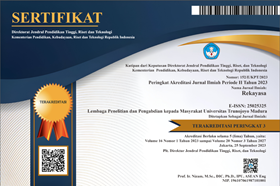Peran Intelijen Maritim Terhadap Keamanan Laut di Selat Sunda
Abstract
The Sunda Strait is one of the shipping lanes that is part of ALKI I which is traversed by cargo ships, tankers, tugboats, fishing vessels and military ships as well as ships using the Sunda Strait to pass from the Indian Ocean to the Java Sea or continue to the Pacific Ocean or vice versa. The tasks and roles of maritime intelligence are an integral part of the overall intelligence activities and operations of the Indonesian Navy, and have a role in providing input and advice on the development of weather conditions, terrain and enemy/future enemies as well as maritime aspects to the leadership in determining policies and decisions on operational aspects. and other interests through a series of activities (functions) of investigation, security and fundraising. The method used in this research is quantitative with a questionnaire using a Likert scale and distributed to 60 people who serve in the ranks of Lantamal III which is then analyzed using Linear Regression Analysis. From the results of the analysis obtained a regression model Y = 4.621 + 0.901 X and it is known that Maritime Intelligence has an influence on Marine Security in the Sunda Strait that is equal to 89,51 %.
Keywords
Full Text:
PDF (Bahasa Indonesia)References
Barry Buzan. People, States and Fears, An Agenda for International Security Studies in Post Cold War. Boulder: Lynne Rienner Publishers. 1991.
British Joint Operational Intelligence. Joint Warfare Publication 2-00; Annex 1A. 2000.
Danial, Afandi Sitamala dan Belardo. Keamanan Dan Pertahanan di Selat Sunda. Jurnal Idea Hukum. Universitas Jenderal Soedirman. Vol 6. No.1 Maret 2020.
Elvis, M. Faisal dan Warka, I Wayan. Implementasi Pengamanan Selat Sunda Dalam Rangka Pengendalian Alur Laut Kepulauan Indonesia I. Jurnal Strategi Pertahanan Laut. Universitas Pertahanan. Volume 6 Nomor 1 Tahun 2020.
Gaol, Trialen Lumban. Peran Asean Maritime Forum (AMF) Dalam Menjaga Keamanan Maritim (Studi Kasus Perompakan Di Perairan Selat Malaka. Jurnal Online Mahasiswa FISIP. Universitas Riau. Volume 4 No. 1 Februari 2017
Garnasih, Yenti. Mungkinkah Suatu Negara Tanpa Intelijen. Jurnal Intelijen dan Kontra Volume IV, no. 22. Jakarta: Centre For The Study Of Intelligence And Counterintelligence. 2008.
Hopple, Gerald W and Watson, Bruce W. The Military Intelligence Community. London: Westview Press/Boulder.1986.
Hutapea, Aris. Manpower Planning. Jurnal Ilmu Administrasi. STIALAN.Vol 1, No 2 2004.
Kent, Sherman. Strategic Intelligence for US World Policy. Hamden: Archon Books. 1965.
Lowenthal, Mark M. Intelligence: From Secrets to Policy. 2nd ed. Washington D.C.: CQPress. 2003.
Marsetio. Sea Power Indonesia. Jakarta: Universitas Pertahanan. 2014.
Ridwan. Metode dan Teknik Menyusun Tesis. Bandung: Alfabeta. 2004.
Rohim, Syaiful. Teori Komunikasi. Jakarta: Rineka Cipta. 2016.
Saronto, Y Wahyu. Intelijen: Teori Intelijen dan Pembangunan Jaringan. Yogyakarta: Andi. 2018.
Sidratahta Mukhtar. Militer dan Demokrasi di Indonesia. Jakarta: Intrans. 2010.
Sinambela. Manajemen Sumber Daya Manusia.Yogyakarta: Andi. 2010.
Siregar, Syofian. Metode Penelitian Kuantitatif. Jakarta: Prenadamia. 2013.
Soegirman, Supono. Intelijen: Profesi unik orang-orang aneh. Jakarta: Medai Bangsa. 2012.
Sugiyono. Metode Penelitian Pendidikan Pendekatan Kuantitatif, kualitatif, dan R&D. Bandung: Alfabeta. 2010.
Sukamtaprawita, Aa Kustia. Intelijen Dilema dan tantangan. Jakarta: Centre For The Study Of Intelligence And Counterintelligence. 2007.
Virgaus, Ahmad. Peran Intelijen TNI Angkatan Laut Dalam Pemberantasan Tindak Pidana di Laut. Jurnal Ilmiah Galuh Justisi. Universitas Galuh. Volume 8 Nomor 1 Maret 2020.
DOI
https://doi.org/10.21107/rekayasa.v14i3.11499Metrics
Refbacks
- There are currently no refbacks.
Copyright (c) 2021 Mohammad Zaki Hartawan, Agung Pramono, Fafan Yudho

This work is licensed under a Creative Commons Attribution-ShareAlike 4.0 International License.
























